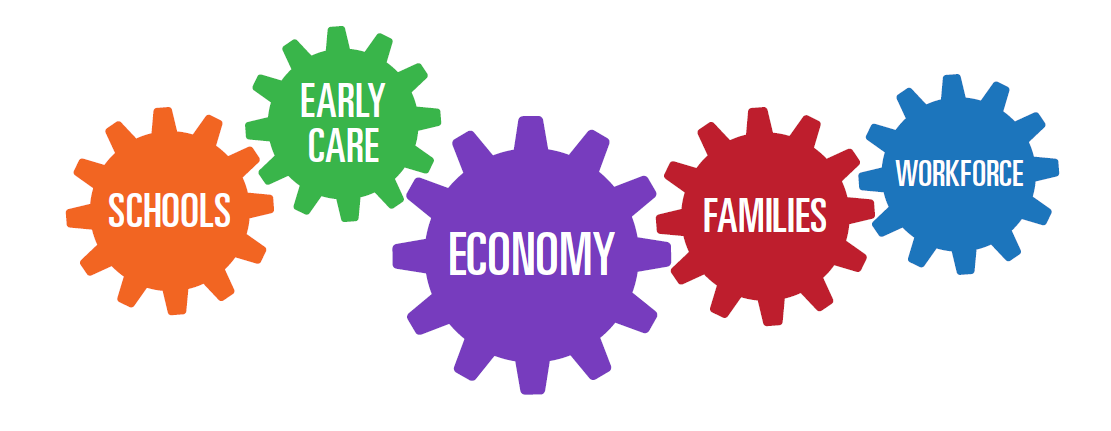

Voices recognized that long-term economic stability is an adverse childhood experience (ACES), which can create and cause economic trauma as a result of toxic stress on the young brain. The child poverty rate in Virginia has remained unchanged since 2008. Ensuring the basic needs of children and families are met will help impoverished families achieve financial independence. According to the Virginia Department of Social Services, the Temporary Assistance for Needy Families (TANF) program provides eligible families with a monthly cash payment to meet their basic needs. For a child to be eligible he must be:
Since 1985 TANF cash assistance payments have been increased only on five occasions and inflation has increased at a much higher rate than the TANF payments. When an economic downturn occurs over a prolonged period of time, this creates toxic stress. We know that poverty reduces the ability for families to have housing, child care, food, transportation, and more; reducing a family’s stress to meet their basic needs could greatly increase familial resilience.
How is Virginia proposing to address this?
Virginia making incremental steps to help overcome these obstacles to overcoming economic trauma. This 2020 General Assembly Session, legislation passed to loosen restrictions on food and cash assistance programs aimed to help ease the impact of poverty. This legislation includes:
TANF diversionary cash assistance. |HB1371|Bourne|Imposes a minimum threshold of $1,500 on TANF diversionary cash assistance. Any person who receives cash assistance waives his eligibility for TANF during the time in which assistance is granted multiplied by 1.33. The bill also requires the Board of Social Services to adopt regulations to enable TANF-eligible applicants meeting certain criteria to receive a TANF emergency assistance payment of up to $1,500 to prevent eviction or to address needs resulting from a fire or natural disaster.
Eligibility for food stamps and TANF |HB566 Guzman /SB124 Favola & Locke| Provides that a person who is otherwise eligible to receive food stamp benefits shall not be denied such assistance solely because he has been convicted of a drug-related felony.
TANF Family Cap |HB690 | Aird| Repeals the prohibition on increasing the amount of TANF that a family receives upon the birth of a child during the period of TANF eligibility or during the period in which the family or adult recipient is ineligible for TANF benefits.
Increase TANF Payment and Income Eligibility|HB30| This amendment increases the TANF cash assistance payment to a total of 15 percent, which includes the five percent increase in the introduced budget. In addition, this amendment increases the income eligibility for TANF that will allow more families to qualify.
Family economic security is one indicator that reduce the risks affiliated with economic hardship, including child abuse, neglect, teen pregnancy, and more. Now is an imperative time to address economic hardship even more. TANF funding could be used as a Covid-19 intervention. Covid-19 has an impact on VA’s most underprivileged families, especially those within the ALICE Population. These are examples of actions the state can take to ease economic hardship through TANF.
Providing TANF emergency assistance for families: The TANF agency could clarify ways that workers can use existing emergency assistance programs by issuing guidance that highlights ways in which coronavirus-related circumstances can qualify a family for this aid.
Raising eligibility limits for families for families who do not qualify: A state may be able to quickly build on an existing program such as emergency assistance or disaster assistance, by raising eligibility limits to serve a broader group of families or expand the scope of when and what benefits can be provided.
Create new programs to provide temporary cash to families: A state could create a new covid-19-specific or disaster-relief-specific program to provide temporary cash to families. There could be minimal eligibility detail required with no asset tests and broad income guidelines, such as serving families with income under 200 percent of the federal poverty line. A state could provide the same assistance to childless individuals by using state funds.
Disregarding discontinued income: For any approach that looks at financial need, it is important that the state disregard any discontinued income from prior months or even if received earlier in the month so that the loss of income is the need being addressed.
Suspending policies that impede appropriate responses to addressing Covid-19: States should suspend mandatory work requirements for applicants and recipients and should not impose any TANF sanctions or time limits during a time of emergency.
During a time where many are able to practice social isolation, early childhood educators, health care workers, tourism and restaurant industry workers, and others, who live paycheck to paycheck, face tough decisions related to staying home while sick or termination and caring for their children home from school or financial stability. Many families are also forced to either prepare for the pandemic or meet their basic needs.
State leaders can implement the TANF budget increases and eligibility criteria during this crisis instead of waiting to July 2020. We hope Virginia leaders can consider the current criteria for the use of TANF and respond in an equitable way to utilize this program. We care for our communities when we care for children!
Read More Blog Posts